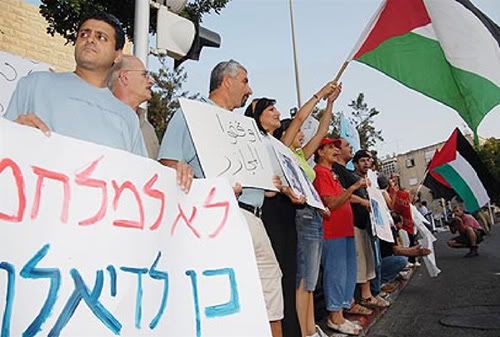The Israeli government took this week a new measure in its attempt to suppress democratic rights in Israel. The government has approved a bill banning all commemoration of the Palestinian Nakba of 1948, under penalty of Imprisonment. The bill is yet to pass in the Israeli parliament, subject, for now, to heavy criticism from many Israeli parties, from the Israeli Labor party to the Jewish-Arab Hadash and the Arab parties. However, since the coalition government in Israel enjoys a majority of seats in the Knesset, the chances for seeing the law pass are quite high.
The bill adds to yet another undemocratic move by the government, that of making a “loyalty test” mandatory for every Israeli citizen. If the bill passes, every Israeli citizen, upon reaching the age of 16, shall be obligated to sign a declaration stating her or his commitment to Israel as a “Jewish and Zionist state,” as well as to serve in the Israeli army or an alternative “national service.” At present, the vast majority of Israeli Arab citizens are exempt from military service, making the loyalty test an instrument for the further discrimination and exclusion of Israeli Arab citizens.
Both of the bills were brought forth by MK Alex Miller of Israel Beytenou party, an ultra-right nationalist party, whose program includes the loyalty to the state as one of its central planks. Currently the party holds 15 seats in the Knesset out of a total of 120, making it the third largest party in Israel. The party is a member of the ruling coalition and holds some key offices in the Israeli cabinet, as high as the office of the Minister of Foreign Affairs.
These steps come at a very troubling time for the democratic rights in Israel. In the run-up to the recent elections, the two parties representing the Arab minority in Israel, Balad (National Democratic Assembly) and Ra’am-Ta’al (United Arab List – Arab Movement for Renewal), were banned from running by the Central Elections Committee. Only after the Supreme Court of Justice overturned the decision were the parties able to participate in the elections.
 Jews and Arabs demonstrating against the war in Gaza |
The Israeli invasion of Gaza of December 2008 was met with consistent opposition of many Arab Israelis, who protested against the exceptional brutality demonstrated in the war by the Israeli army. The demonstrations were joined by hundreds of Jewish peace activists, who called for ceasefire and bilateral negotiations. Many of the demonstrators, especially those of Arab ethnicity, were portrayed as “disloyal” and as “fifth columns” in the dominant Israeli discourse, which questioned their right for assembly and free speech in time of war while describing the demonstrations as “disturbances” and even “lynching.”
In addition, during the weeks of the war, dozens of Israeli citizens were arrested in a procedure known as “administrative detention,” i.e., the arrest and incarceration of suspects without proper judicial process. Even a prominent Israeli journalist — Amira Hass, who writes frequently on the topic of human rights and resides in Gaza City — was arrested by the police. The restrictions on Israeli and foreign journalists during the weeks of combat in Gaza even triggered the demotion of Israel in the international Freedom House index from “free” to “partly free.”
While many global militants for the Palestinian cause are already standing up for human and political rights in Palestine, it is also necessary to view these issues in the context of the looming threats to Israeli civil society. The closing of political discourse and the erosion of civil rights in Israel put in danger the ability of oppositional forces within Israel to voice their opinions and to disseminate information, which in turn will make it even more difficult to end the occupation.
Daniel Rosenberg is an Israeli student, education worker, and activist for peace and social justice.
